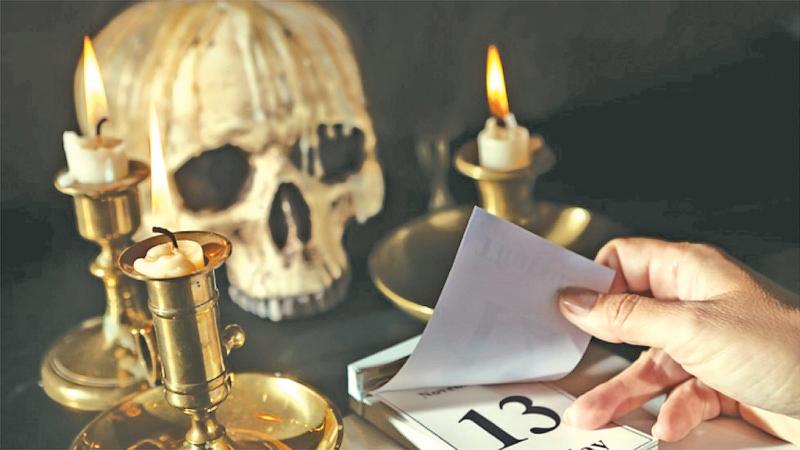
Has somebody ever told you “God bless you” when you sneezed? Have you ever wondered where this belief originated?
One theory suggests, it comes from the time of the Great Plague of London (or bubonic plague) in 1665. One of the symptoms of the plague was coughing and sneezing, and it is believed, Pope Gregory I suggested saying “God bless you” after a person sneezed, in the hope that this prayer would protect them from an otherwise certain death. Of course, there are other theories as well.
Such superstitions have been with us since the beginning of time and will remain with us till the very end. They are powerful and can influence people how to behave and act in everyday life. They are also very mysterious. Take for example, a black cat in the night. Do you shiver or feel scared when a black cat crosses your path? The ancient belief dates way back when it was thought that cats were the companions of a group of witches and that it changed into a witch after seven years of working. So, people assumed that a cat that crosses your path might be a witch or a devil that is up to no good.
Forms
Few people will admit to being superstitious; it implies naiveté or ignorance. During my long career, I have moved around with a lot of educated business professionals, and I’ve seen superstition in all its four manifestations. They were alive and flourishing among those people who were indisputably rational and learned.
Before we continue, I am sure most of you are not aware that superstition takes four forms. Canadian writer Robertson Davies first presented this theory and today, most theologians assure us that he is right.
First is what they call vain observances. This is where you do things that is not really going to help you, but you think it would. For example, you wouldn’t cremate or bury your dead parent on a Friday. When I asked a CEO of a company why he did it, he replied, with a wink, that it was supposed to be a ‘bad’ day for important events in life or death.
The second form is Divination, or consulting oracles.The composition of crowds at various devales dedicated to different deities is an indication of our reliance in divination. A senior executive told me when he had to settle a company problem, he visits his devale and makes a vow to return with presents if he is guided to come out of it. He told me quite seriously that he had resolved many matters related to company affairs by doing that.
The third one is idolatry Good luck charms. Many senior executives have in their possession jujus, amulets, lucky coins and other bringers of luck. Modest idolatry, what else can you call it? The fourth one is the improper worship of the deity.You would have witnessed how devotees bring carefully- prepared trays of offerings, consisting of a variety of fruits, a garland and betel leaves when they visit devales. You would also have seen how some people place a few Rs. 5,000 notes on the betel leaves. The intention is to draw the deity’s attention quickly.
Challenge
We, Sri Lankans, have many superstitions. Many of us believe in the existence of thousands of gods, demons, spirits, etc. that influence human life. We observe auspicious times, avoid ill omens, and are wary of taboos. Psychologists say, our reliance on superstition interferes with our ability to deal rationally with issues in the real world. Fictitious beliefs not only make reason irrelevant, but confident autonomous action impossible in the management of problems, they add.
Of course, we are not the only superstitious people in the world. There is no culture that is totally free from superstitious beliefs and practices. It is interesting to consider why people’s beliefs in superstitions persist in the world despite the most amazing discoveries and inventions of modern science and technology.
Fate
Obviously, ignorance and fear play a significant role in generating and propagating superstitions, as the ‘faith-cure’ and ‘grease devil’ incidents show. But there must be other reasons, too. Superstitions seem to run below the surface of our consciousness, deeply submerged as crude beliefs. Many superstitions are so widespread and so old that they must have risen from a depth of the human mind that is indifferent to race, creed or religion.
Take for example, sneezing, once again. Another theory says, some people of Middle Europe believed when a man sneezed, his soul for that moment is taken off from his body. So, people blessed him to expedite its return lest it be seized by the Devil. How did the Melanesians come by the same idea? Superstition seems to have a link with somebody of belief that far precedes the religions we know - religions which have no place for such comforting little ceremonies and charities.
Superstition in general is linked to man’s yearning to know his fate, and to have some hand in deciding it.
I knew an Italian, a good businessman, who looked out every morning before leaving his house, so that the first person he met would not be a priest or a nun, as this would certainly bring bad luck.
I am not one to stand aloof from the rest of humanity in this matter, for when I was a university student in New Delhi, a gypsy woman with a child in her arms used to appear every year at examination time and ask two Indian rupees of anyone who touched the Lucky Baby; that dark-skinned infant cost me eight Indian Rupees altogether which was a big investment for a campus student at that time.
Of course,I never failed an examination and did well in all four. Come to think of it, I started it merely for the joke - or so I thought then. Now, however, I am humbler and have my own reservations.
